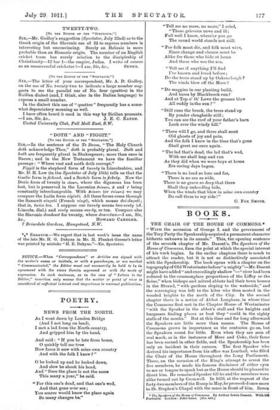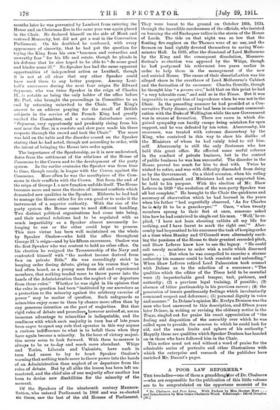BOOKS.
THE CHAIR OF THE HOUSE OF COMMONS.* " WITH the accession of George I. and the government of the Tory Party the Speakership acquired a permanent character hitherto unknown in its annals." This, the opening sentence of the seventh chapter of Mr. Dasent's, The Speakers of the House of Commons, fixes the point at which the special interest of his work begins. In the earlier chapters there is much to attract the reader, but it is not so distinctively associated with the Speakership. The book opens with a chapter on the topography of Old Westminster before" a mighty "—Mr. Dasent might have added " and exceedingly shallow "—" river had been reduced to the commonplace proportions of the Liffey or the Seine," when bishops and mitred abbots had their town houses in the Strand, " with gardens sloping to the waterside," and the scavenging was left to the kites who then nested in the wooded heights to the north of the City. In the second chapter there is a notice of Abbot Langbam, in whose time the Commons first met in the Chapter House of Westminster " with the Speaker in the abbot's stall and the knights and burgesses finding places as best they " could in the eighty stalls of the monks." But at this time and for long afterward the Speakers are little more than names. The House of Commons grows in importance as the centuries go on, but the Speakers count for little. Even when they are men of real mark, as in the instances of More and Coke, their fame has been earned in other fields, and the Speakership has been only an incident in their careers. The first Speaker who derived his importance from his office was Lenthall, who filled the Chair of the House throughout the Long Parliament. There, on the occasion of the King's attempt to arrest the five members, he made his famous disclaimer of either eyes to see or tongue to speak but as the House should be pleased to direct him. He remained Speaker till he and the members were alike turned out by CromwelL In 1659, at the request of the forty-two members of the Rump in May, he proceeded once more to St. Stephen's Chapel with the mace in front of him. Seven • The Speakers of the MUSS of Commons. By Arthur Irwin Dasent. With 109 Portraits. London: John Lane. lam. net.] months later he was prevented by Lambert from entering the House and on Christmas Eve in the same year was again placed in the Chair. He declared himself on the side of Monk and restored Monarchy, but did not get a seat in the Convention Parliament. On his deathbed he confessed, with every appearance of sincerity, that he had put the question for trying the King from his own "baseness and cowardice and unworthy fear " for his life and estate, though he pleads in his defence that he also hoped to be able to " do some good and hinder some ill." No Speaker has had the same apparent opportunities of independent action as Lenthall, though it is not at all clear that any other Speaker could have used them to any better purpose. Among Lent- hall's successors during the next four reigns Sir Edward Seymour, who was twice Speaker in the reign of Charles II., is notable as being the only holder of the office before Mr. Peel, who brought the proceedings in Committee to an end by returning uninvited to the Chair. The King's answer to an address praying for the recall of British subjects in the service of the French King had greatly excited the Committee, and a serious disturbance arose. " Seymour, very opportunely and prudently rising from his seat near the Bar, in a resolute and slow pace made his three respects through the crowd and took the Chair." The mace was laid on the table and the disorder ceased on the Speaker stating that he had acted, though not according to order, with the intent of bringing the House into order again.
The importance of the Speakership, as it is now understood, dates from the settlement of the relations of the House of Cmumons to the Crown and to the development of the party system. In the earlier centuries the Speaker was from time to time, though rarely, in league with the Crown against the Commons. More often he was the mouthpiece of the Com- mons in their conflicts with the Crown. But from the end of the reign of George I. a new function unfolds itself. The House becomes more and more the theatre of internal conflicts which demanded new qualities in the Speaker. Hitherto he had had to manage the House either for its own good or to make it the instrument of a superior authority. With the rise of the party system the House came to need different handling. Two distinct political organizations had come into being, and their mutual relations had to be regulated with as much impartiality as a Speaker almost necessarily be- longing to one or the other could hope to possess. This rare virtue has been well maintained on the whole by Speaker Onslow—who held the office throughout George II.'s reign—and by his fifteen successors. Onslow was the first Speaker who was content to hold no other office. On his election he resigned the Treasurership of the Navy and contented himself with " the modest income derived from fees on private Bills." He was exceedingly strict in keeping order during debate, giving as his reason that "he had often heard, as a young man from old and experienced members, that nothing tended more to throw power into the hands of the Administration than the neglect of or departure from these rules." Whether he was right in his opinion that the rules in question Lad been " instituted by our ancestors as a protection to the minority against the arbitrary exercise of power" may be matter of question. Such safeguards as minorities enjoy come to them by chance more often than by any generous intention on the part of majorities. But that rigid rules of debate and procedureohowever arrived at, are an immense advantage to minorities is indisputable, and the readiness with which each majority in turn has of late years been eager to upset any rule that operates in this way argues a curious indifference to what is to befall them when they have again become a minority. In the hour of victory majori- ties never seem to look forward. With them to-morrow is always to be as to-day and much more abundant. Whigs and Tories, Liberals and Unionists, have each in turn had cause to lay to heart Speaker Onslow's warning that nothing tends more to throw power into the bands of an Administration than neglect of or departure from the rules of debate. But by all alike the lesson has been left un- mastered, and the chief aim of one-majority after another has been to devise new disabilities for the minority of the moment.
Of the Speakers of the nineteenth century Manners- Sutton, who entered Parliament in 1806 and was re-elected six times, saw the last of the old Houses of Parliament. They were burnt to the ground on October 16th, 1834, through the incredible carelessness of the officials, who insisted on burning the old Exchequer tallies in the Stoves of the House of Lords. The tide on that night was so low that the floating fire engines on the Thames were of no use, and the firemen on land rightly devoted themselves to saving West- minster Hall. In 1835, after the dismissal of Lord Melbourne by the King and the consequent dissolution, Manners- Sutton's re-election was opposed by the Whigs, though be had postponed his retirement two years earlier in order to help them in the management of the new and untried House. The cause of their elissatiafaction was his alleged share in the overthrow of Lord Melbourne's Cabinet and the formation of its successor. Charles Greville, though he thought him " a poem sire," held that on this point he had " a very tolerable case," and said so in the Times. But it was impossible to acquit him of imprudence when he was not in the Chair. In the preceding summer he had presided at a Con- servative Party dinner, and he had been in constant communi- cation with the Duke of Wellington while the new Government was in course of formation. There are cases in which dis- guised sympathy can hardly escape being mistaken for open support, and he was defeated by ten votes. Abercromby, his successor, was treated with extreme discourtesy by the King, who contrived in this way to show his dislike of the Ministers of whom he had vainly tried to rid him- self. Abereromby is still the only Scotsman who has held this great office. He effected some useful reforms in the conduct of private business, but in the control of public business he was less successful. The disorder in the House proved too much for him to deal with. Twice he wished to retire, and was with difficulty dissuaded from doing so by the Government. On a third occasion, when his ruling had been questioned and Ministers had not supported him, he held to his purpose. With the election of Mr. Shaw Lefevre in 1839 " the evolution of the non-party Speaker was all but complete." He brought to the Chair the quickness and accuracy of observation which he had learned in the years when his father " had regretfully observed, ' As for Charles he is @oily fit to be a gamekeeper.' " Once, " when twenty members sprang to their feet at once, someone asked him how he had contrived to single out his man. ' Well,' he re- plied, ' I have not been shooting rabbits all my life for nothing, and I have learnt to mark the right one." Aber- comby had bequeathed to his successor the task of keeping order at a time when Stanley and O'Connell were alternately excit- ing the passions of the House to their greatest recorded pitch, and Shaw Lefevre knew how to use the legacy. "He could call unruly members to order with a smile which disarmed anger. . . . But when he was compelled to exercise a sterner authority his manner could be both resolute and unbending." When Shaw Lefevre retired Lord Palmerston took counsel with Delane as to the selection of a successor : "The qualities which the editor of the Times held to be essential were (1) imperturbable good temper, tact, patience, and authority ; (2) a previous legal training, if possible; (3) absence of bitter partisanship in his previous career ; (4) the possession of innate gentlemanly feelings which involuntarily command respect and deference ; (5) personal dignity in voice and manner." In Delane's opinion Mr. Evelyn Denison was the man who best answered to this description, and fifteen years later Delane, in writing or revising the obituary notice in the Times, singled out for praise his exact appreciation of "the feeling and disposition of the assembly over which be was called upon to preside, the sources to which he could look for aid, and the exact limits and sphere of his authority." Happily these are qualities which Speaker Denison has handed on to those who have followed him in the Chair.
This notice -must not end without a word of praise for the admirable series of portraits and other illustrations with which the enterprise and research of the publisher have enriched Mr. Dasent's pages.







































 Previous page
Previous page